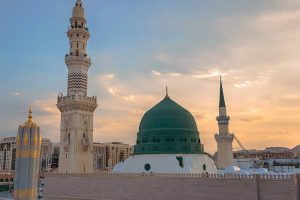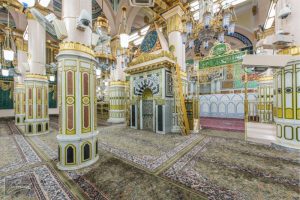Hazrat Shaikh Moulana Muhammad Zakariyya (rahmatullahi ‘alaih) once mentioned the following: As far as the sin of shaving and trimming the beard (less than a fist length) is concerned, then though it is (a major sin, it is) not as severe as the sins of zina and consuming alcohol, etc. …
Read More »Purchasing Land for the Extension of the Musjid-ul-Haraam
On one occasion, Rasulullah (sallallahu ‘alaihi wasallam) approached a certain person in Makkah Mukarramah and said to him, “O so-and-so! Will you sell your house to me, so that I may extend the area of the musjid around the Ka’bah, and in reward for this good action, I will guarantee …
Read More »The Outcome of Showing Disrespect to the Sahaabah (radhiyallahu ‘anhum) – The Orchards of Love – Part Fifty Eight
Hazrat Abu Hurairah (radhiyallahu ‘anhu) is a famous Sahaabi of Rasulullah (sallallahu ‘alaihi wasallam). He embraced Islam in the year 7 A.H. and remained with Rasulullah (sallallahu ‘alaihi wasallam) till the end of his life. Though he spent only a few years with Rasulullah (sallallahu ‘alaihi wasallam), Allah Ta‘ala blessed …
Read More »The Criteria when selecting a Sheikh
Hazrat Moulana Ashraf Ali Thaanwi (rahimahullah) once mentioned: In the path of seeking self-reformation, it is obvious that a person will be in need of a sheikh (spiritual guide to guide him through the path). However, since many people are unaware of the procedure to follow and the criteria to …
Read More »Equipping the Expedition of Tabook
Hazrat ‘Abdur Rahmaan bin Khabbaab (radhiyallahu ‘anhu) narrates the following: I was present when Rasulullah (sallallahu ‘alaihi wasallam) was encouraging the Sahaabah (radhiyallahu ‘anhum) to equip the army and contribute towards the expedition of Tabook. On that occasion, Hazrat ‘Uthmaan (radhiyallahu ‘anhu) stood and said, “O Rasul of Allah (sallallahu …
Read More »The Position of Fazaa’il and Masaa’il
Hazrat Moulana Muhammad Ilyaas (rahmatullahi ‘alaih) once mentioned the following: The position of fazaa’il (virtues and rewards of various good deeds) is before masaa’il. When people come to know of the fazaa’il (virtues and rewards of various good deeds), then they will have conviction and yaqeen of receiving virtues and …
Read More »Concern of Accountability in the Hereafter
On one occasion, Hazrat ‘Uthmaan (radhiyallahu ‘anhu) entered his animal pen and found his slave feeding fodder to a camel. On inspecting the fodder, Hazrat ‘Uthmaan (radhiyallahu ‘anhu) was not pleased with the manner in which the slave had prepared it and thus twisted his ear. After a little while, …
Read More »Love and Respect for Deen – The Orchards of Love – Part Fifty Seven
The entire structure of Islam rests upon the foundation of love and respect. Every aspect of Islam gains value when coupled with the quality of love and respect. Hence, at all times, a believer should endeavour to possess the deepest love and respect for Allah Ta‘ala, thereafter for His Rasul …
Read More »How to Respond to People’s Correction
Hazrat Shaikh Moulana Muhammad Zakariyya (rahmatullahi ‘alaih) once mentioned the following: My beloved brothers! There is something which I wish to mention! If you hear people attributing any weakness or fault to me, then you should inform me of what they have said about me. In reality, when people pull …
Read More »Ten special virtues of Hazrat Uthmaan (radhiyallahu ‘anhu)
Hazrat Abu Thowr (rahimahullah) narrates that he once came to Hazrat Uthmaan (radhiyallahu ‘anhu) and heard him mention the following at the time when wrong criticism was being levelled against him. He said: There are ten good deeds which I have secured by Allah Ta’ala and for each deed I …
Read More » Ihyaaud Deen An Effort to Revive Deen in Totality
Ihyaaud Deen An Effort to Revive Deen in Totality









